Report: Unveiling Social Issues in Orwell's 'The Road to Wigan Pier'
VerifiedAdded on 2023/06/18
|8
|3016
|165
Report
AI Summary
This report provides an analysis of George Orwell's 'The Road to Wigan Pier', focusing on the social, political, and cultural context of the book. It discusses Orwell's background, his experiences in northern England, and his evolving political beliefs. The report highlights the living conditions of the working class, the role of class distinctions, and Orwell's perspective on socialism. It also examines Orwell's writing style and his methodology in portraying the realities of poverty and unemployment in 1930s England, emphasizing the book's lasting legacy and its impact on his later works.

Reading Modern Society
Paraphrase This Document
Need a fresh take? Get an instant paraphrase of this document with our AI Paraphraser
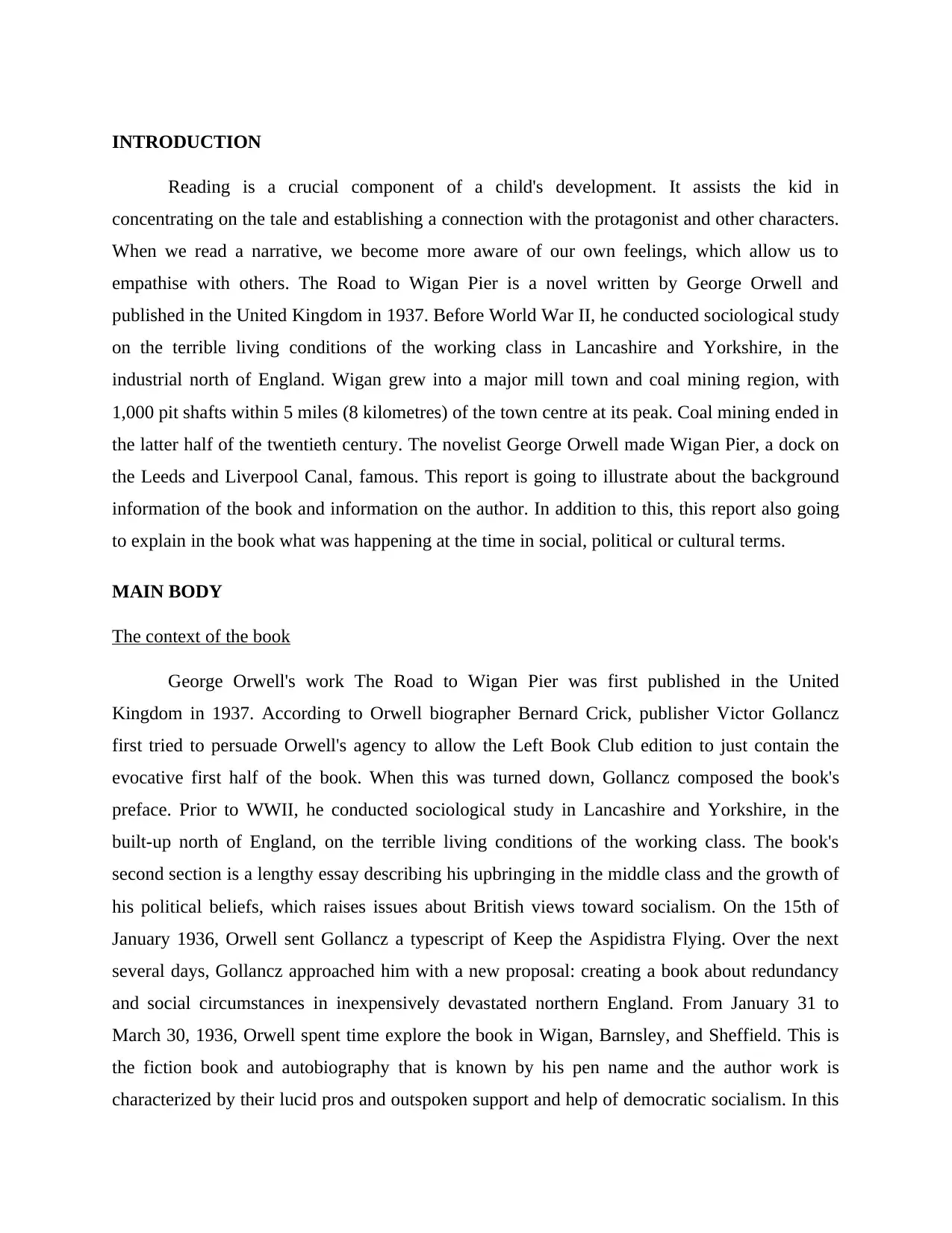
INTRODUCTION
Reading is a crucial component of a child's development. It assists the kid in
concentrating on the tale and establishing a connection with the protagonist and other characters.
When we read a narrative, we become more aware of our own feelings, which allow us to
empathise with others. The Road to Wigan Pier is a novel written by George Orwell and
published in the United Kingdom in 1937. Before World War II, he conducted sociological study
on the terrible living conditions of the working class in Lancashire and Yorkshire, in the
industrial north of England. Wigan grew into a major mill town and coal mining region, with
1,000 pit shafts within 5 miles (8 kilometres) of the town centre at its peak. Coal mining ended in
the latter half of the twentieth century. The novelist George Orwell made Wigan Pier, a dock on
the Leeds and Liverpool Canal, famous. This report is going to illustrate about the background
information of the book and information on the author. In addition to this, this report also going
to explain in the book what was happening at the time in social, political or cultural terms.
MAIN BODY
The context of the book
George Orwell's work The Road to Wigan Pier was first published in the United
Kingdom in 1937. According to Orwell biographer Bernard Crick, publisher Victor Gollancz
first tried to persuade Orwell's agency to allow the Left Book Club edition to just contain the
evocative first half of the book. When this was turned down, Gollancz composed the book's
preface. Prior to WWII, he conducted sociological study in Lancashire and Yorkshire, in the
built-up north of England, on the terrible living conditions of the working class. The book's
second section is a lengthy essay describing his upbringing in the middle class and the growth of
his political beliefs, which raises issues about British views toward socialism. On the 15th of
January 1936, Orwell sent Gollancz a typescript of Keep the Aspidistra Flying. Over the next
several days, Gollancz approached him with a new proposal: creating a book about redundancy
and social circumstances in inexpensively devastated northern England. From January 31 to
March 30, 1936, Orwell spent time explore the book in Wigan, Barnsley, and Sheffield. This is
the fiction book and autobiography that is known by his pen name and the author work is
characterized by their lucid pros and outspoken support and help of democratic socialism. In this
Reading is a crucial component of a child's development. It assists the kid in
concentrating on the tale and establishing a connection with the protagonist and other characters.
When we read a narrative, we become more aware of our own feelings, which allow us to
empathise with others. The Road to Wigan Pier is a novel written by George Orwell and
published in the United Kingdom in 1937. Before World War II, he conducted sociological study
on the terrible living conditions of the working class in Lancashire and Yorkshire, in the
industrial north of England. Wigan grew into a major mill town and coal mining region, with
1,000 pit shafts within 5 miles (8 kilometres) of the town centre at its peak. Coal mining ended in
the latter half of the twentieth century. The novelist George Orwell made Wigan Pier, a dock on
the Leeds and Liverpool Canal, famous. This report is going to illustrate about the background
information of the book and information on the author. In addition to this, this report also going
to explain in the book what was happening at the time in social, political or cultural terms.
MAIN BODY
The context of the book
George Orwell's work The Road to Wigan Pier was first published in the United
Kingdom in 1937. According to Orwell biographer Bernard Crick, publisher Victor Gollancz
first tried to persuade Orwell's agency to allow the Left Book Club edition to just contain the
evocative first half of the book. When this was turned down, Gollancz composed the book's
preface. Prior to WWII, he conducted sociological study in Lancashire and Yorkshire, in the
built-up north of England, on the terrible living conditions of the working class. The book's
second section is a lengthy essay describing his upbringing in the middle class and the growth of
his political beliefs, which raises issues about British views toward socialism. On the 15th of
January 1936, Orwell sent Gollancz a typescript of Keep the Aspidistra Flying. Over the next
several days, Gollancz approached him with a new proposal: creating a book about redundancy
and social circumstances in inexpensively devastated northern England. From January 31 to
March 30, 1936, Orwell spent time explore the book in Wigan, Barnsley, and Sheffield. This is
the fiction book and autobiography that is known by his pen name and the author work is
characterized by their lucid pros and outspoken support and help of democratic socialism. In this
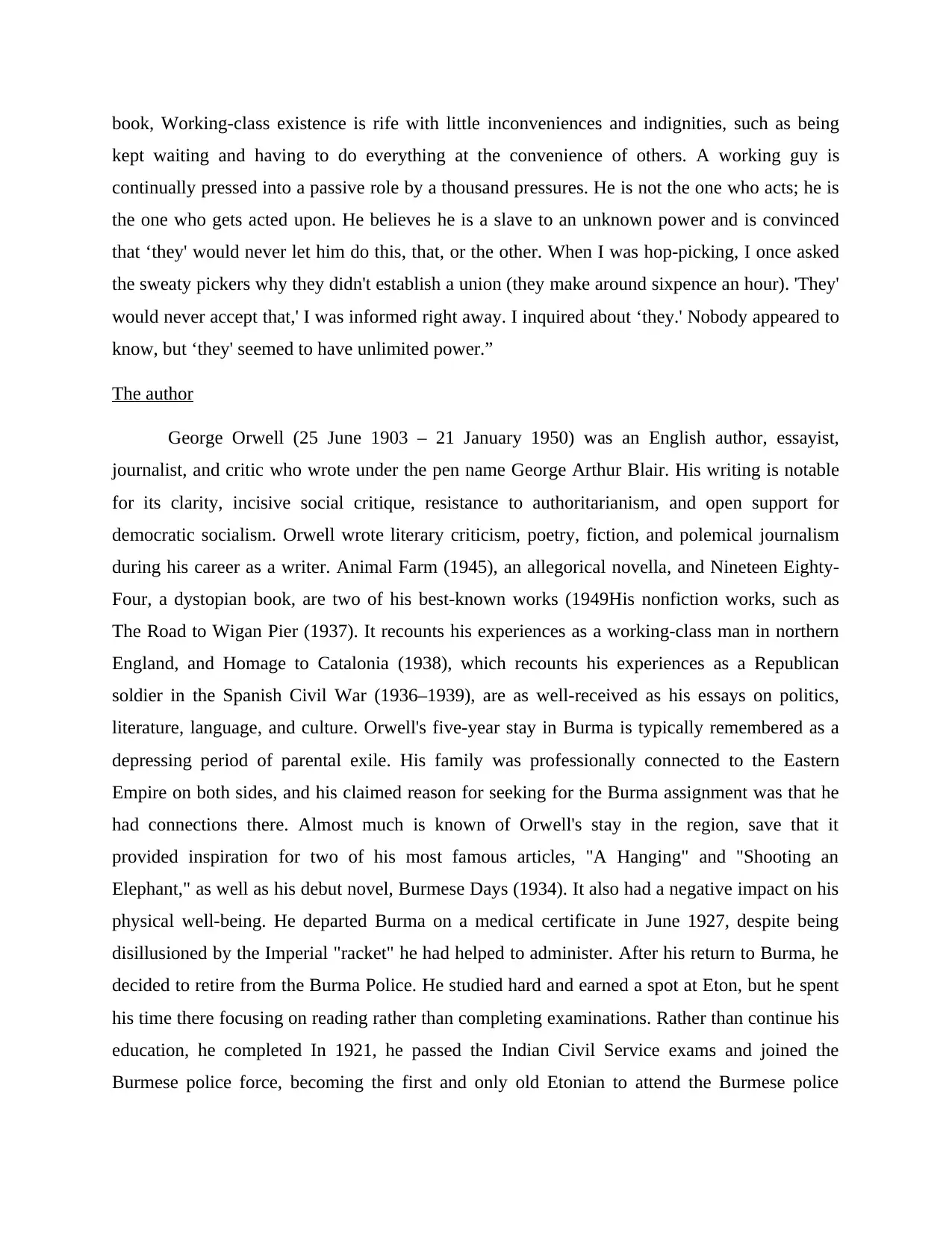
book, Working-class existence is rife with little inconveniences and indignities, such as being
kept waiting and having to do everything at the convenience of others. A working guy is
continually pressed into a passive role by a thousand pressures. He is not the one who acts; he is
the one who gets acted upon. He believes he is a slave to an unknown power and is convinced
that ‘they' would never let him do this, that, or the other. When I was hop-picking, I once asked
the sweaty pickers why they didn't establish a union (they make around sixpence an hour). 'They'
would never accept that,' I was informed right away. I inquired about ‘they.' Nobody appeared to
know, but ‘they' seemed to have unlimited power.”
The author
George Orwell (25 June 1903 – 21 January 1950) was an English author, essayist,
journalist, and critic who wrote under the pen name George Arthur Blair. His writing is notable
for its clarity, incisive social critique, resistance to authoritarianism, and open support for
democratic socialism. Orwell wrote literary criticism, poetry, fiction, and polemical journalism
during his career as a writer. Animal Farm (1945), an allegorical novella, and Nineteen Eighty-
Four, a dystopian book, are two of his best-known works (1949His nonfiction works, such as
The Road to Wigan Pier (1937). It recounts his experiences as a working-class man in northern
England, and Homage to Catalonia (1938), which recounts his experiences as a Republican
soldier in the Spanish Civil War (1936–1939), are as well-received as his essays on politics,
literature, language, and culture. Orwell's five-year stay in Burma is typically remembered as a
depressing period of parental exile. His family was professionally connected to the Eastern
Empire on both sides, and his claimed reason for seeking for the Burma assignment was that he
had connections there. Almost much is known of Orwell's stay in the region, save that it
provided inspiration for two of his most famous articles, "A Hanging" and "Shooting an
Elephant," as well as his debut novel, Burmese Days (1934). It also had a negative impact on his
physical well-being. He departed Burma on a medical certificate in June 1927, despite being
disillusioned by the Imperial "racket" he had helped to administer. After his return to Burma, he
decided to retire from the Burma Police. He studied hard and earned a spot at Eton, but he spent
his time there focusing on reading rather than completing examinations. Rather than continue his
education, he completed In 1921, he passed the Indian Civil Service exams and joined the
Burmese police force, becoming the first and only old Etonian to attend the Burmese police
kept waiting and having to do everything at the convenience of others. A working guy is
continually pressed into a passive role by a thousand pressures. He is not the one who acts; he is
the one who gets acted upon. He believes he is a slave to an unknown power and is convinced
that ‘they' would never let him do this, that, or the other. When I was hop-picking, I once asked
the sweaty pickers why they didn't establish a union (they make around sixpence an hour). 'They'
would never accept that,' I was informed right away. I inquired about ‘they.' Nobody appeared to
know, but ‘they' seemed to have unlimited power.”
The author
George Orwell (25 June 1903 – 21 January 1950) was an English author, essayist,
journalist, and critic who wrote under the pen name George Arthur Blair. His writing is notable
for its clarity, incisive social critique, resistance to authoritarianism, and open support for
democratic socialism. Orwell wrote literary criticism, poetry, fiction, and polemical journalism
during his career as a writer. Animal Farm (1945), an allegorical novella, and Nineteen Eighty-
Four, a dystopian book, are two of his best-known works (1949His nonfiction works, such as
The Road to Wigan Pier (1937). It recounts his experiences as a working-class man in northern
England, and Homage to Catalonia (1938), which recounts his experiences as a Republican
soldier in the Spanish Civil War (1936–1939), are as well-received as his essays on politics,
literature, language, and culture. Orwell's five-year stay in Burma is typically remembered as a
depressing period of parental exile. His family was professionally connected to the Eastern
Empire on both sides, and his claimed reason for seeking for the Burma assignment was that he
had connections there. Almost much is known of Orwell's stay in the region, save that it
provided inspiration for two of his most famous articles, "A Hanging" and "Shooting an
Elephant," as well as his debut novel, Burmese Days (1934). It also had a negative impact on his
physical well-being. He departed Burma on a medical certificate in June 1927, despite being
disillusioned by the Imperial "racket" he had helped to administer. After his return to Burma, he
decided to retire from the Burma Police. He studied hard and earned a spot at Eton, but he spent
his time there focusing on reading rather than completing examinations. Rather than continue his
education, he completed In 1921, he passed the Indian Civil Service exams and joined the
Burmese police force, becoming the first and only old Etonian to attend the Burmese police
⊘ This is a preview!⊘
Do you want full access?
Subscribe today to unlock all pages.

Trusted by 1+ million students worldwide
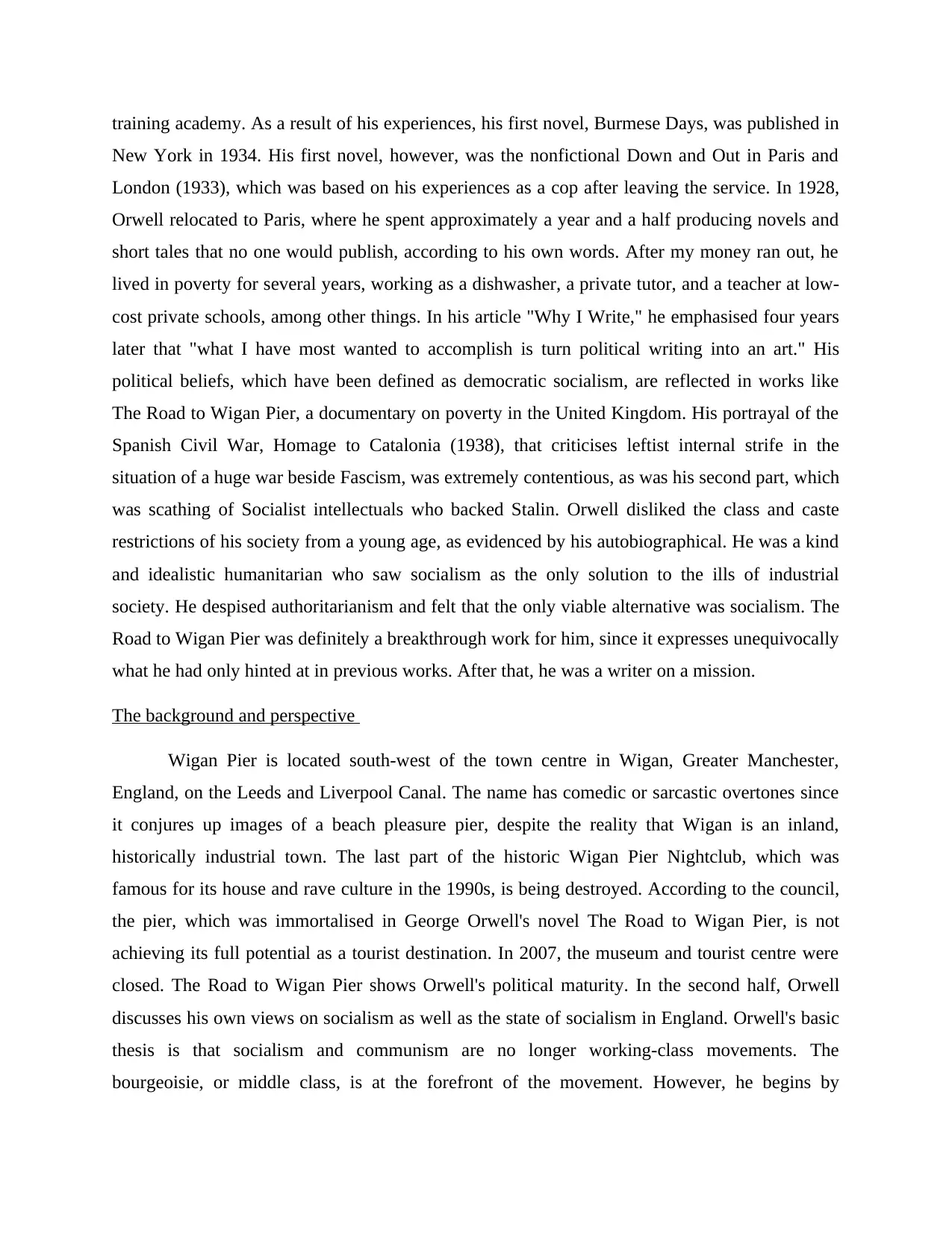
training academy. As a result of his experiences, his first novel, Burmese Days, was published in
New York in 1934. His first novel, however, was the nonfictional Down and Out in Paris and
London (1933), which was based on his experiences as a cop after leaving the service. In 1928,
Orwell relocated to Paris, where he spent approximately a year and a half producing novels and
short tales that no one would publish, according to his own words. After my money ran out, he
lived in poverty for several years, working as a dishwasher, a private tutor, and a teacher at low-
cost private schools, among other things. In his article "Why I Write," he emphasised four years
later that "what I have most wanted to accomplish is turn political writing into an art." His
political beliefs, which have been defined as democratic socialism, are reflected in works like
The Road to Wigan Pier, a documentary on poverty in the United Kingdom. His portrayal of the
Spanish Civil War, Homage to Catalonia (1938), that criticises leftist internal strife in the
situation of a huge war beside Fascism, was extremely contentious, as was his second part, which
was scathing of Socialist intellectuals who backed Stalin. Orwell disliked the class and caste
restrictions of his society from a young age, as evidenced by his autobiographical. He was a kind
and idealistic humanitarian who saw socialism as the only solution to the ills of industrial
society. He despised authoritarianism and felt that the only viable alternative was socialism. The
Road to Wigan Pier was definitely a breakthrough work for him, since it expresses unequivocally
what he had only hinted at in previous works. After that, he was a writer on a mission.
The background and perspective
Wigan Pier is located south-west of the town centre in Wigan, Greater Manchester,
England, on the Leeds and Liverpool Canal. The name has comedic or sarcastic overtones since
it conjures up images of a beach pleasure pier, despite the reality that Wigan is an inland,
historically industrial town. The last part of the historic Wigan Pier Nightclub, which was
famous for its house and rave culture in the 1990s, is being destroyed. According to the council,
the pier, which was immortalised in George Orwell's novel The Road to Wigan Pier, is not
achieving its full potential as a tourist destination. In 2007, the museum and tourist centre were
closed. The Road to Wigan Pier shows Orwell's political maturity. In the second half, Orwell
discusses his own views on socialism as well as the state of socialism in England. Orwell's basic
thesis is that socialism and communism are no longer working-class movements. The
bourgeoisie, or middle class, is at the forefront of the movement. However, he begins by
New York in 1934. His first novel, however, was the nonfictional Down and Out in Paris and
London (1933), which was based on his experiences as a cop after leaving the service. In 1928,
Orwell relocated to Paris, where he spent approximately a year and a half producing novels and
short tales that no one would publish, according to his own words. After my money ran out, he
lived in poverty for several years, working as a dishwasher, a private tutor, and a teacher at low-
cost private schools, among other things. In his article "Why I Write," he emphasised four years
later that "what I have most wanted to accomplish is turn political writing into an art." His
political beliefs, which have been defined as democratic socialism, are reflected in works like
The Road to Wigan Pier, a documentary on poverty in the United Kingdom. His portrayal of the
Spanish Civil War, Homage to Catalonia (1938), that criticises leftist internal strife in the
situation of a huge war beside Fascism, was extremely contentious, as was his second part, which
was scathing of Socialist intellectuals who backed Stalin. Orwell disliked the class and caste
restrictions of his society from a young age, as evidenced by his autobiographical. He was a kind
and idealistic humanitarian who saw socialism as the only solution to the ills of industrial
society. He despised authoritarianism and felt that the only viable alternative was socialism. The
Road to Wigan Pier was definitely a breakthrough work for him, since it expresses unequivocally
what he had only hinted at in previous works. After that, he was a writer on a mission.
The background and perspective
Wigan Pier is located south-west of the town centre in Wigan, Greater Manchester,
England, on the Leeds and Liverpool Canal. The name has comedic or sarcastic overtones since
it conjures up images of a beach pleasure pier, despite the reality that Wigan is an inland,
historically industrial town. The last part of the historic Wigan Pier Nightclub, which was
famous for its house and rave culture in the 1990s, is being destroyed. According to the council,
the pier, which was immortalised in George Orwell's novel The Road to Wigan Pier, is not
achieving its full potential as a tourist destination. In 2007, the museum and tourist centre were
closed. The Road to Wigan Pier shows Orwell's political maturity. In the second half, Orwell
discusses his own views on socialism as well as the state of socialism in England. Orwell's basic
thesis is that socialism and communism are no longer working-class movements. The
bourgeoisie, or middle class, is at the forefront of the movement. However, he begins by
Paraphrase This Document
Need a fresh take? Get an instant paraphrase of this document with our AI Paraphraser
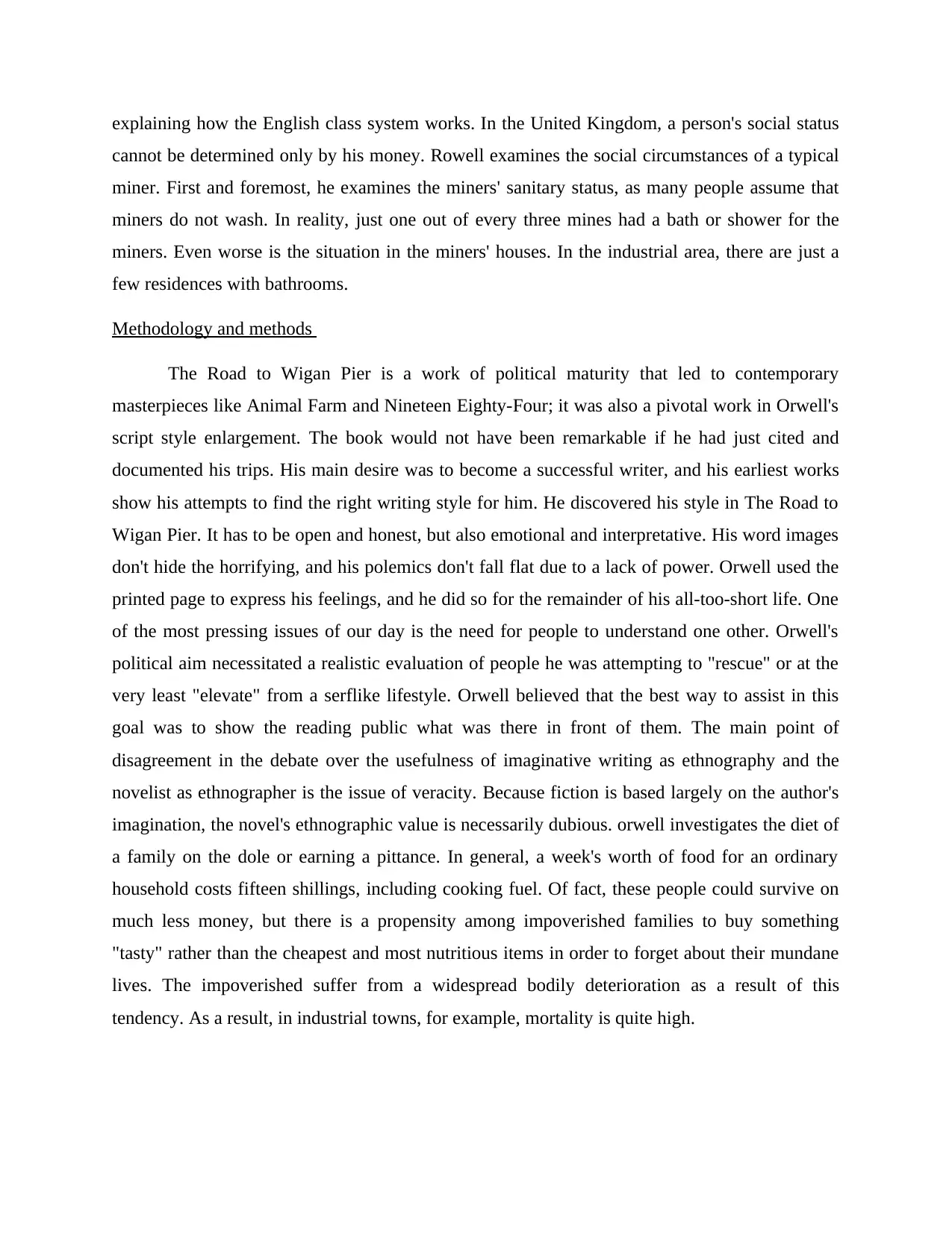
explaining how the English class system works. In the United Kingdom, a person's social status
cannot be determined only by his money. Rowell examines the social circumstances of a typical
miner. First and foremost, he examines the miners' sanitary status, as many people assume that
miners do not wash. In reality, just one out of every three mines had a bath or shower for the
miners. Even worse is the situation in the miners' houses. In the industrial area, there are just a
few residences with bathrooms.
Methodology and methods
The Road to Wigan Pier is a work of political maturity that led to contemporary
masterpieces like Animal Farm and Nineteen Eighty-Four; it was also a pivotal work in Orwell's
script style enlargement. The book would not have been remarkable if he had just cited and
documented his trips. His main desire was to become a successful writer, and his earliest works
show his attempts to find the right writing style for him. He discovered his style in The Road to
Wigan Pier. It has to be open and honest, but also emotional and interpretative. His word images
don't hide the horrifying, and his polemics don't fall flat due to a lack of power. Orwell used the
printed page to express his feelings, and he did so for the remainder of his all-too-short life. One
of the most pressing issues of our day is the need for people to understand one other. Orwell's
political aim necessitated a realistic evaluation of people he was attempting to "rescue" or at the
very least "elevate" from a serflike lifestyle. Orwell believed that the best way to assist in this
goal was to show the reading public what was there in front of them. The main point of
disagreement in the debate over the usefulness of imaginative writing as ethnography and the
novelist as ethnographer is the issue of veracity. Because fiction is based largely on the author's
imagination, the novel's ethnographic value is necessarily dubious. orwell investigates the diet of
a family on the dole or earning a pittance. In general, a week's worth of food for an ordinary
household costs fifteen shillings, including cooking fuel. Of fact, these people could survive on
much less money, but there is a propensity among impoverished families to buy something
"tasty" rather than the cheapest and most nutritious items in order to forget about their mundane
lives. The impoverished suffer from a widespread bodily deterioration as a result of this
tendency. As a result, in industrial towns, for example, mortality is quite high.
cannot be determined only by his money. Rowell examines the social circumstances of a typical
miner. First and foremost, he examines the miners' sanitary status, as many people assume that
miners do not wash. In reality, just one out of every three mines had a bath or shower for the
miners. Even worse is the situation in the miners' houses. In the industrial area, there are just a
few residences with bathrooms.
Methodology and methods
The Road to Wigan Pier is a work of political maturity that led to contemporary
masterpieces like Animal Farm and Nineteen Eighty-Four; it was also a pivotal work in Orwell's
script style enlargement. The book would not have been remarkable if he had just cited and
documented his trips. His main desire was to become a successful writer, and his earliest works
show his attempts to find the right writing style for him. He discovered his style in The Road to
Wigan Pier. It has to be open and honest, but also emotional and interpretative. His word images
don't hide the horrifying, and his polemics don't fall flat due to a lack of power. Orwell used the
printed page to express his feelings, and he did so for the remainder of his all-too-short life. One
of the most pressing issues of our day is the need for people to understand one other. Orwell's
political aim necessitated a realistic evaluation of people he was attempting to "rescue" or at the
very least "elevate" from a serflike lifestyle. Orwell believed that the best way to assist in this
goal was to show the reading public what was there in front of them. The main point of
disagreement in the debate over the usefulness of imaginative writing as ethnography and the
novelist as ethnographer is the issue of veracity. Because fiction is based largely on the author's
imagination, the novel's ethnographic value is necessarily dubious. orwell investigates the diet of
a family on the dole or earning a pittance. In general, a week's worth of food for an ordinary
household costs fifteen shillings, including cooking fuel. Of fact, these people could survive on
much less money, but there is a propensity among impoverished families to buy something
"tasty" rather than the cheapest and most nutritious items in order to forget about their mundane
lives. The impoverished suffer from a widespread bodily deterioration as a result of this
tendency. As a result, in industrial towns, for example, mortality is quite high.
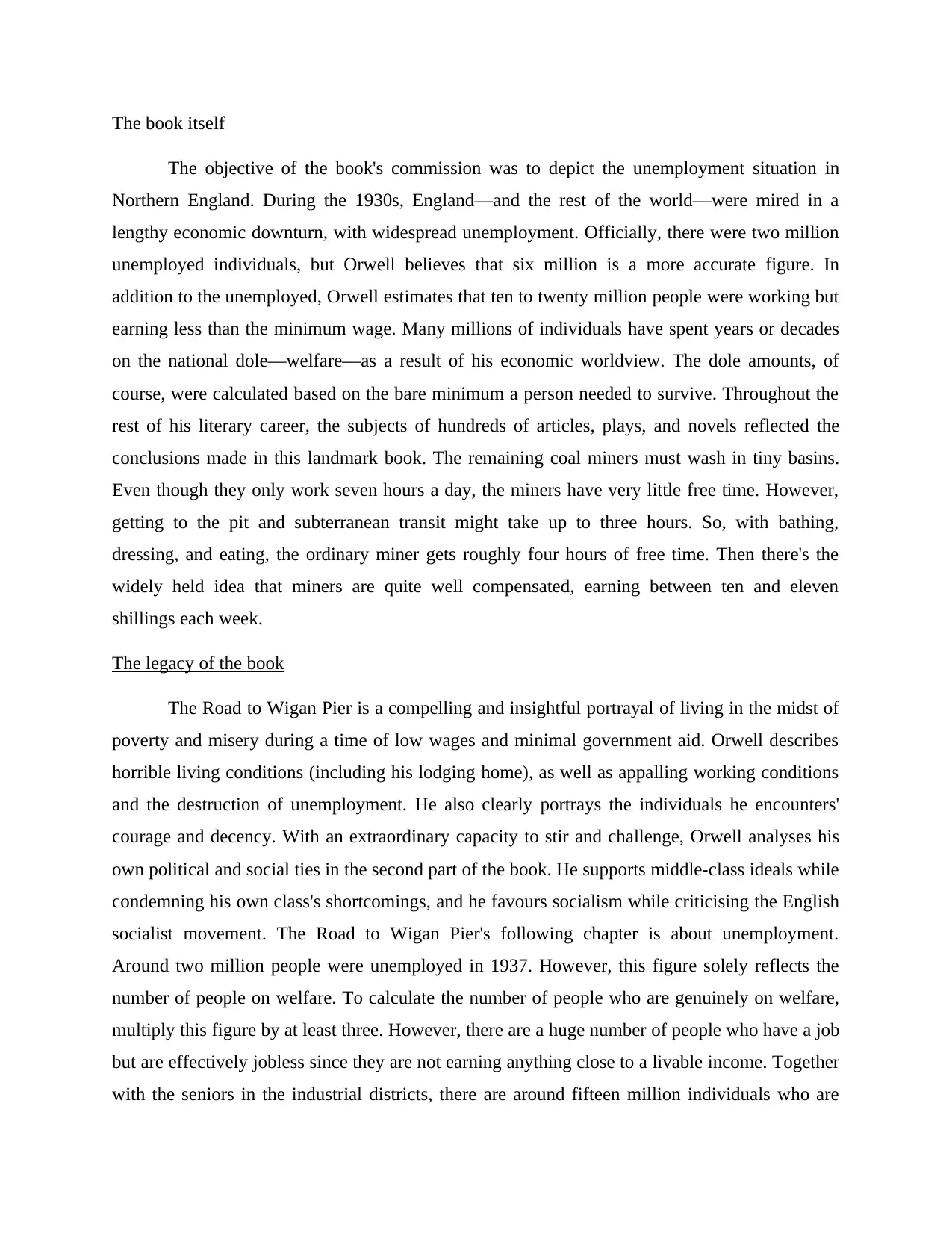
The book itself
The objective of the book's commission was to depict the unemployment situation in
Northern England. During the 1930s, England—and the rest of the world—were mired in a
lengthy economic downturn, with widespread unemployment. Officially, there were two million
unemployed individuals, but Orwell believes that six million is a more accurate figure. In
addition to the unemployed, Orwell estimates that ten to twenty million people were working but
earning less than the minimum wage. Many millions of individuals have spent years or decades
on the national dole—welfare—as a result of his economic worldview. The dole amounts, of
course, were calculated based on the bare minimum a person needed to survive. Throughout the
rest of his literary career, the subjects of hundreds of articles, plays, and novels reflected the
conclusions made in this landmark book. The remaining coal miners must wash in tiny basins.
Even though they only work seven hours a day, the miners have very little free time. However,
getting to the pit and subterranean transit might take up to three hours. So, with bathing,
dressing, and eating, the ordinary miner gets roughly four hours of free time. Then there's the
widely held idea that miners are quite well compensated, earning between ten and eleven
shillings each week.
The legacy of the book
The Road to Wigan Pier is a compelling and insightful portrayal of living in the midst of
poverty and misery during a time of low wages and minimal government aid. Orwell describes
horrible living conditions (including his lodging home), as well as appalling working conditions
and the destruction of unemployment. He also clearly portrays the individuals he encounters'
courage and decency. With an extraordinary capacity to stir and challenge, Orwell analyses his
own political and social ties in the second part of the book. He supports middle-class ideals while
condemning his own class's shortcomings, and he favours socialism while criticising the English
socialist movement. The Road to Wigan Pier's following chapter is about unemployment.
Around two million people were unemployed in 1937. However, this figure solely reflects the
number of people on welfare. To calculate the number of people who are genuinely on welfare,
multiply this figure by at least three. However, there are a huge number of people who have a job
but are effectively jobless since they are not earning anything close to a livable income. Together
with the seniors in the industrial districts, there are around fifteen million individuals who are
The objective of the book's commission was to depict the unemployment situation in
Northern England. During the 1930s, England—and the rest of the world—were mired in a
lengthy economic downturn, with widespread unemployment. Officially, there were two million
unemployed individuals, but Orwell believes that six million is a more accurate figure. In
addition to the unemployed, Orwell estimates that ten to twenty million people were working but
earning less than the minimum wage. Many millions of individuals have spent years or decades
on the national dole—welfare—as a result of his economic worldview. The dole amounts, of
course, were calculated based on the bare minimum a person needed to survive. Throughout the
rest of his literary career, the subjects of hundreds of articles, plays, and novels reflected the
conclusions made in this landmark book. The remaining coal miners must wash in tiny basins.
Even though they only work seven hours a day, the miners have very little free time. However,
getting to the pit and subterranean transit might take up to three hours. So, with bathing,
dressing, and eating, the ordinary miner gets roughly four hours of free time. Then there's the
widely held idea that miners are quite well compensated, earning between ten and eleven
shillings each week.
The legacy of the book
The Road to Wigan Pier is a compelling and insightful portrayal of living in the midst of
poverty and misery during a time of low wages and minimal government aid. Orwell describes
horrible living conditions (including his lodging home), as well as appalling working conditions
and the destruction of unemployment. He also clearly portrays the individuals he encounters'
courage and decency. With an extraordinary capacity to stir and challenge, Orwell analyses his
own political and social ties in the second part of the book. He supports middle-class ideals while
condemning his own class's shortcomings, and he favours socialism while criticising the English
socialist movement. The Road to Wigan Pier's following chapter is about unemployment.
Around two million people were unemployed in 1937. However, this figure solely reflects the
number of people on welfare. To calculate the number of people who are genuinely on welfare,
multiply this figure by at least three. However, there are a huge number of people who have a job
but are effectively jobless since they are not earning anything close to a livable income. Together
with the seniors in the industrial districts, there are around fifteen million individuals who are
⊘ This is a preview!⊘
Do you want full access?
Subscribe today to unlock all pages.

Trusted by 1+ million students worldwide
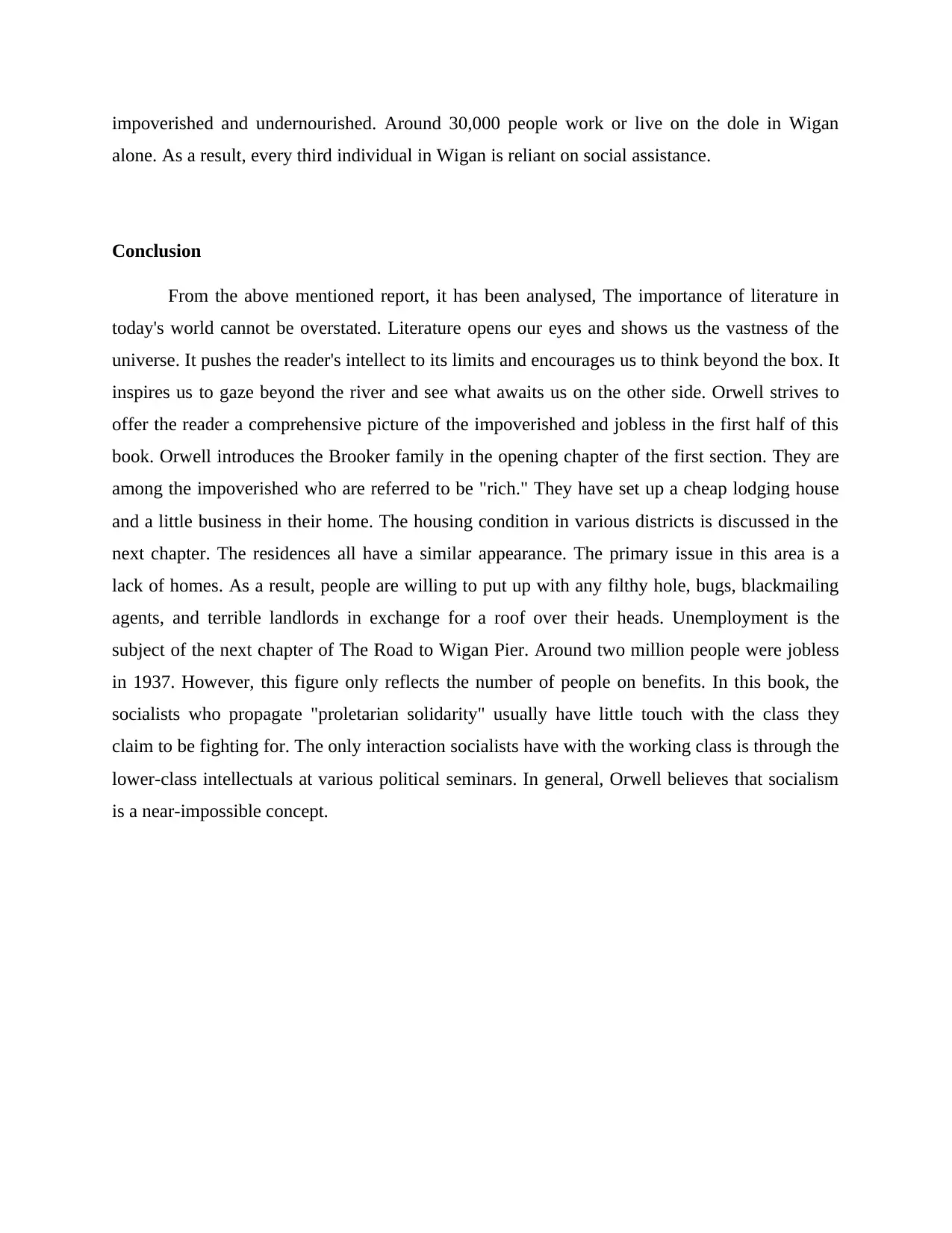
impoverished and undernourished. Around 30,000 people work or live on the dole in Wigan
alone. As a result, every third individual in Wigan is reliant on social assistance.
Conclusion
From the above mentioned report, it has been analysed, The importance of literature in
today's world cannot be overstated. Literature opens our eyes and shows us the vastness of the
universe. It pushes the reader's intellect to its limits and encourages us to think beyond the box. It
inspires us to gaze beyond the river and see what awaits us on the other side. Orwell strives to
offer the reader a comprehensive picture of the impoverished and jobless in the first half of this
book. Orwell introduces the Brooker family in the opening chapter of the first section. They are
among the impoverished who are referred to be "rich." They have set up a cheap lodging house
and a little business in their home. The housing condition in various districts is discussed in the
next chapter. The residences all have a similar appearance. The primary issue in this area is a
lack of homes. As a result, people are willing to put up with any filthy hole, bugs, blackmailing
agents, and terrible landlords in exchange for a roof over their heads. Unemployment is the
subject of the next chapter of The Road to Wigan Pier. Around two million people were jobless
in 1937. However, this figure only reflects the number of people on benefits. In this book, the
socialists who propagate "proletarian solidarity" usually have little touch with the class they
claim to be fighting for. The only interaction socialists have with the working class is through the
lower-class intellectuals at various political seminars. In general, Orwell believes that socialism
is a near-impossible concept.
alone. As a result, every third individual in Wigan is reliant on social assistance.
Conclusion
From the above mentioned report, it has been analysed, The importance of literature in
today's world cannot be overstated. Literature opens our eyes and shows us the vastness of the
universe. It pushes the reader's intellect to its limits and encourages us to think beyond the box. It
inspires us to gaze beyond the river and see what awaits us on the other side. Orwell strives to
offer the reader a comprehensive picture of the impoverished and jobless in the first half of this
book. Orwell introduces the Brooker family in the opening chapter of the first section. They are
among the impoverished who are referred to be "rich." They have set up a cheap lodging house
and a little business in their home. The housing condition in various districts is discussed in the
next chapter. The residences all have a similar appearance. The primary issue in this area is a
lack of homes. As a result, people are willing to put up with any filthy hole, bugs, blackmailing
agents, and terrible landlords in exchange for a roof over their heads. Unemployment is the
subject of the next chapter of The Road to Wigan Pier. Around two million people were jobless
in 1937. However, this figure only reflects the number of people on benefits. In this book, the
socialists who propagate "proletarian solidarity" usually have little touch with the class they
claim to be fighting for. The only interaction socialists have with the working class is through the
lower-class intellectuals at various political seminars. In general, Orwell believes that socialism
is a near-impossible concept.
Paraphrase This Document
Need a fresh take? Get an instant paraphrase of this document with our AI Paraphraser
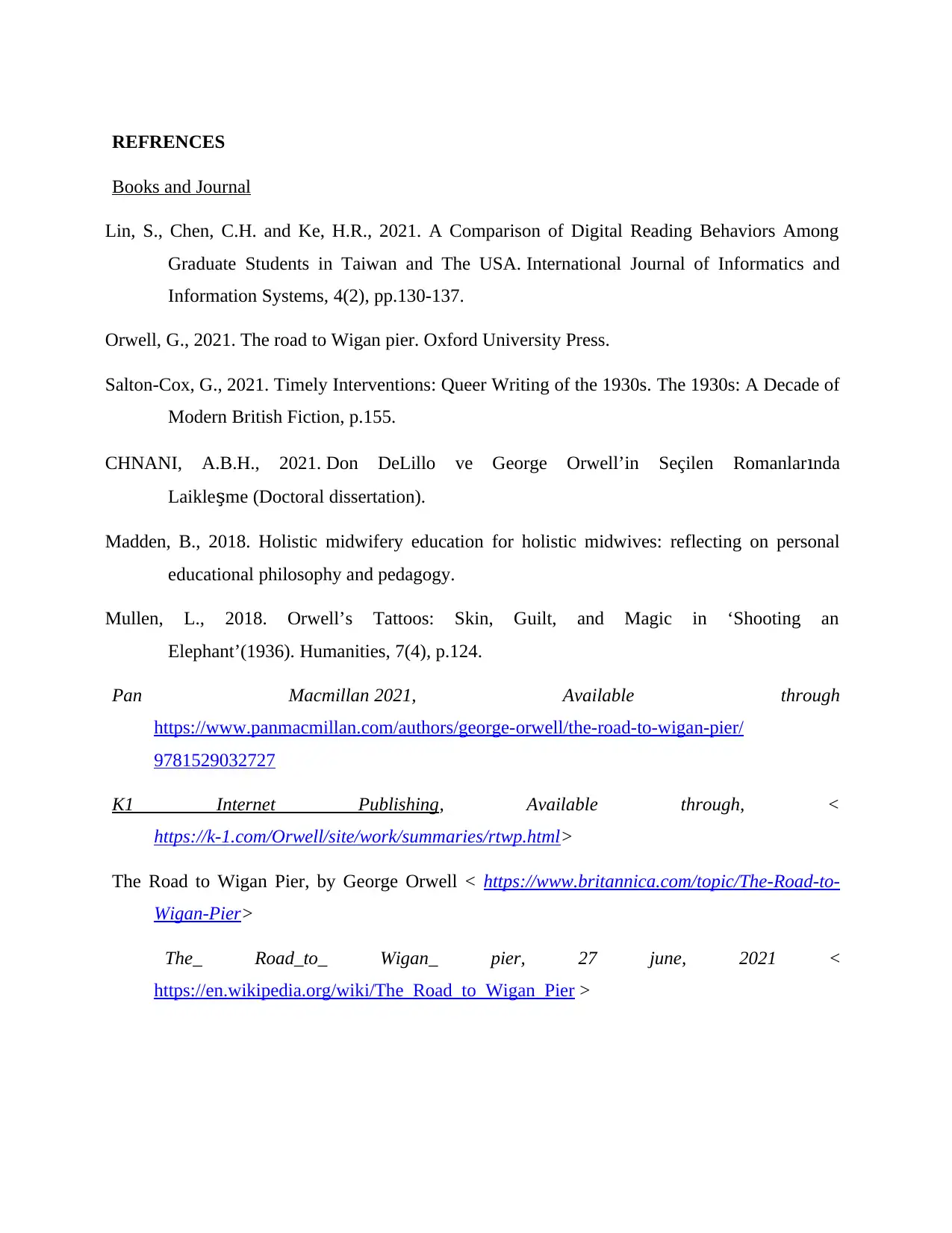
REFRENCES
Books and Journal
Lin, S., Chen, C.H. and Ke, H.R., 2021. A Comparison of Digital Reading Behaviors Among
Graduate Students in Taiwan and The USA. International Journal of Informatics and
Information Systems, 4(2), pp.130-137.
Orwell, G., 2021. The road to Wigan pier. Oxford University Press.
Salton-Cox, G., 2021. Timely Interventions: Queer Writing of the 1930s. The 1930s: A Decade of
Modern British Fiction, p.155.
CHNANI, A.B.H., 2021. Don DeLillo ve George Orwell’in Seçilen Romanlarında
Laikleşme (Doctoral dissertation).
Madden, B., 2018. Holistic midwifery education for holistic midwives: reflecting on personal
educational philosophy and pedagogy.
Mullen, L., 2018. Orwell’s Tattoos: Skin, Guilt, and Magic in ‘Shooting an
Elephant’(1936). Humanities, 7(4), p.124.
Pan Macmillan 2021, Available through
https://www.panmacmillan.com/authors/george-orwell/the-road-to-wigan-pier/
9781529032727
K1 Internet Publishing, Available through, <
https://k-1.com/Orwell/site/work/summaries/rtwp.html>
The Road to Wigan Pier, by George Orwell < https://www.britannica.com/topic/The-Road-to-
Wigan-Pier>
The_ Road_to_ Wigan_ pier, 27 june, 2021 <
https://en.wikipedia.org/wiki/The_Road_to_Wigan_Pier >
Books and Journal
Lin, S., Chen, C.H. and Ke, H.R., 2021. A Comparison of Digital Reading Behaviors Among
Graduate Students in Taiwan and The USA. International Journal of Informatics and
Information Systems, 4(2), pp.130-137.
Orwell, G., 2021. The road to Wigan pier. Oxford University Press.
Salton-Cox, G., 2021. Timely Interventions: Queer Writing of the 1930s. The 1930s: A Decade of
Modern British Fiction, p.155.
CHNANI, A.B.H., 2021. Don DeLillo ve George Orwell’in Seçilen Romanlarında
Laikleşme (Doctoral dissertation).
Madden, B., 2018. Holistic midwifery education for holistic midwives: reflecting on personal
educational philosophy and pedagogy.
Mullen, L., 2018. Orwell’s Tattoos: Skin, Guilt, and Magic in ‘Shooting an
Elephant’(1936). Humanities, 7(4), p.124.
Pan Macmillan 2021, Available through
https://www.panmacmillan.com/authors/george-orwell/the-road-to-wigan-pier/
9781529032727
K1 Internet Publishing, Available through, <
https://k-1.com/Orwell/site/work/summaries/rtwp.html>
The Road to Wigan Pier, by George Orwell < https://www.britannica.com/topic/The-Road-to-
Wigan-Pier>
The_ Road_to_ Wigan_ pier, 27 june, 2021 <
https://en.wikipedia.org/wiki/The_Road_to_Wigan_Pier >
1 out of 8
Related Documents
Your All-in-One AI-Powered Toolkit for Academic Success.
+13062052269
info@desklib.com
Available 24*7 on WhatsApp / Email
![[object Object]](/_next/static/media/star-bottom.7253800d.svg)
Unlock your academic potential
Copyright © 2020–2026 A2Z Services. All Rights Reserved. Developed and managed by ZUCOL.




